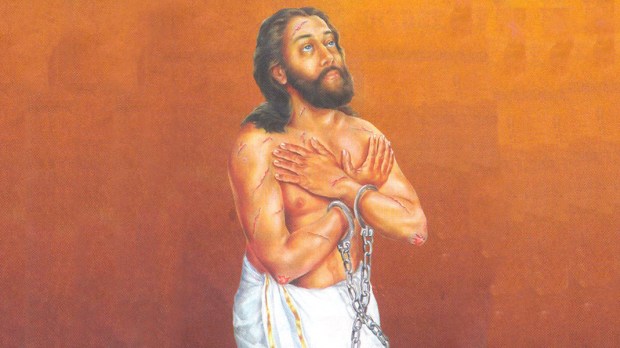January 14 is the feast day of Blessed Devasahayam Pillai, the first Indian lay martyr to be beatified.
Popularly known as Devasahayam (God’s help), he was born Nilakandan Pillai (1712-1752) into a Hindu family in the then Kingdom of Travancore (in the present district of Kanyakumari, in Tamil Nadu), southern India.
Pillai, an upper-caste Hindu nair convert to Christianity, was a member of the royal service and was close to King Marthanda Varma, then-ruler of Travancore. He was very much loved by the king and was a good man who was faithful to his duty. However, after several bad harvests, he lost his goods. This devastated him and he wondered: “Who will respect me now that I’m poor?”
Nilakandan shared his worries with a devout Catholic, a Dutch official by the name of Benedictus Eustachio De Lannoy, who explained to him the meaning of suffering in the light of the Book of Job. For Nilakandan, Job’s example and his trust in God was decisive. Convinced of the truth of the Christian mysteries, Nilakandan asked for Baptism, which he received in 1745 from the hands of Father Giovanni Battista Buttari, a Jesuit missionary, after nine months of preparation. He took the name Devasahayam, the Tamil translation of the biblical name Lazarus, which means “God has helped.”
On the day of his Baptism, Devasahayam dedicated himself solemnly to Christ: “No one [forced] me to come; I came by my own free will. I know my heart: He is my God. I have decided to follow Him and will do so my whole life.” His life was no longer the same; Devasahayam dedicated himself to the proclamation of the Gospel for four years.
However, the heads of his native religion did not look kindly on his conversion to Christianity. He was threatened, beaten, mistreated, imprisoned and tortured uninterruptedly for three years. Despite his sufferings, Devasahayam remained firm in his faith. His wife, Bhargavi Ammal, too became Catholic and she took the name Gnanapoo Ammal (Theresa). Their conversion antagonized upper-caste Hindus and the king commanded Pillai to reconvert to Hinduism but he refused.
Noticing that many were following Devasahayam’s example, the king ordered his arrest in 1749, charging him with treason and espionage. He was imprisoned, tortured and finally banished to the Aralvaimozhy forest, a remote border area of Travancore. According to Church documents, en route to the forest, he was beaten daily, pepper was rubbed in his wounds and nostrils and he was exposed to the sun and given only stagnant water to drink. He prayed to God weeping, and hit the rock with his elbow, which gave forth water in a miraculous way he could drink. This rock continues even today to give water and even now people visit this fountain in large numbers. Today people drink this miraculous water and receive God’s healing. This rock is called Muttidichanparai, meaning the rock from which water gushed forth.
He was a Catholic for only seven years. In that short period, he was in prison for three years under severe persecution for witnessing his faith. Finally, he was shot dead in the Aralvaimozhy forest on January 14, 1752. His corpse was thrown into the forest, but was found by some Christians who buried him in front of the altar of the church of St. Francis Xavier, which would later become the cathedral of the diocese of Kottar.
Very soon Devasahayam was venerated in the region. His beatification was already desired in 1756, but it was only in 1993 that his cause was opened canonically in the diocese.
Soon a ceremony of beatification and declaration of martyrdom was held in Nagercoil on December 2, 2012, in the Roman Catholic diocese of Kottar, southern India, exactly 300 years after his birth! Prior to this, on June 28, 2012, the then Pope Benedict XVI authorized the Congregation for the Causes of Saints to promulgate a decree regarding the martyrdom of Devasahayam Pillai and he was referred to as “Venerable.”
Pillai’s tomb at St. Francis Xavier Cathedral in Nagercoil attracts large numbers of devotees. His life teaches how to witness our faith. While undergoing severe persecution, he never complained or was deterred. The spirit of evangelism was strong in him.
Prayer to Blessed Devasahayam Blessed Devasahayam, For the love of Christ you willingly and patiently underwent torments and tortures for three years, and willingly sacrificed your life and obtained the joy of eternal life and the veneration at the altars as God’s great reward. We praise and thank God for blessing you with this glorious life. You set apart your whole life for preaching the Kingdom of God, leaving behind all the worldly pleasures of wealth, status, name, fame and glory. You as a true Disciple of Christ faithfully put into practice the values of the Gospel, the equality and Fraternity of all people on earth. Assist us to follow you in leaving behind all worldly pleasures and help us to live as children of the kingdom of God and put into practice faithfully the values of the Gospel so that we may one day enter into eternal life to be with God and your company forever and ever. O! Blessed Devasahayam, Glorious Martyr! Pray For Us!
This article has been kindly granted to Aleteia by our partners in India, Indian Catholic Matters. We encourage you to visit their full website, here.

